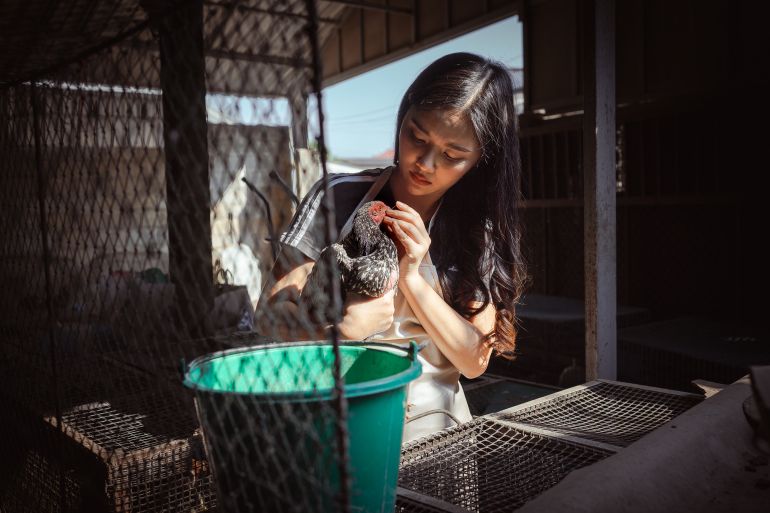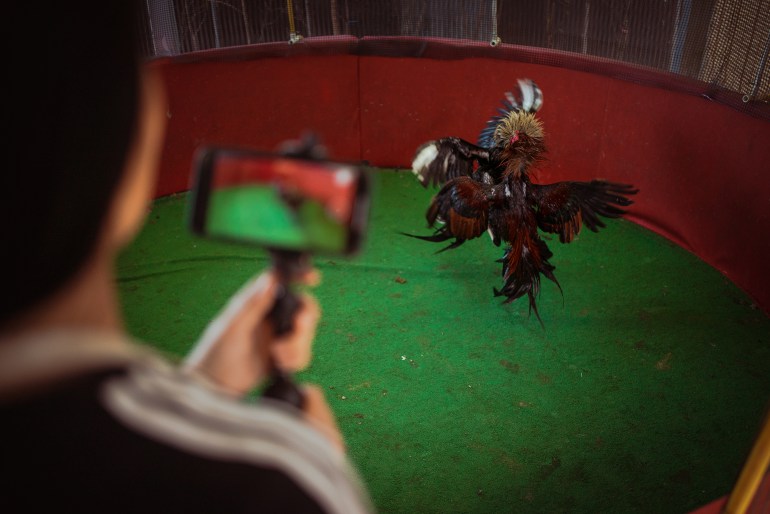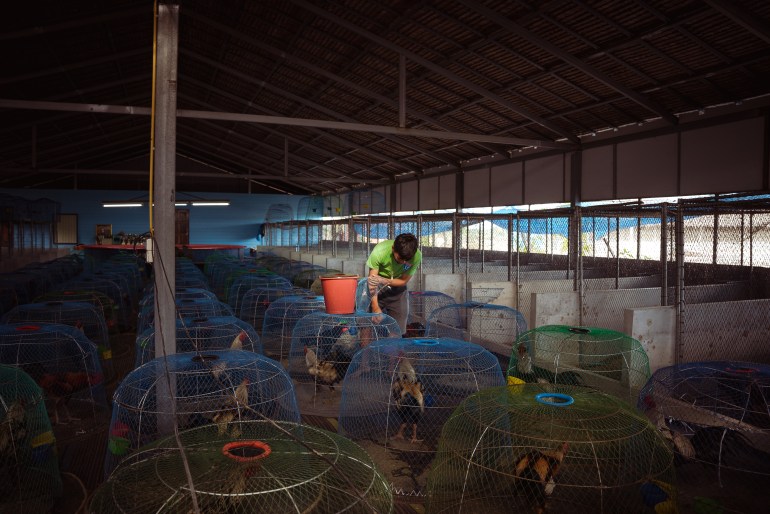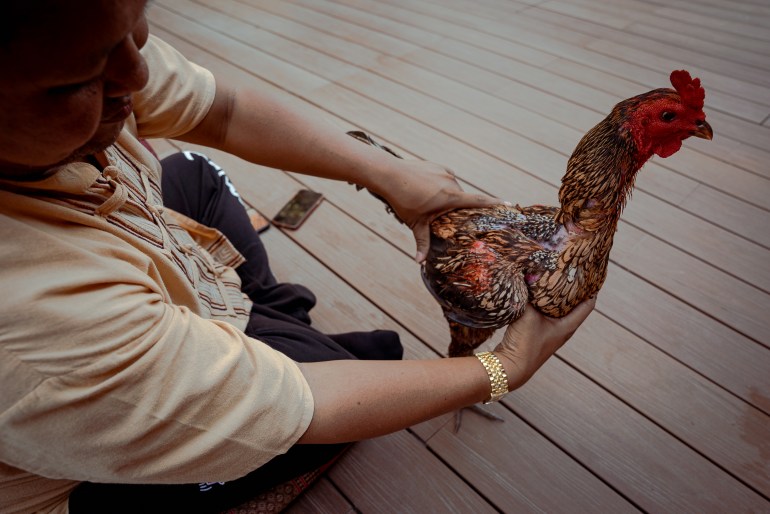Gamefowl millionaire: Thai women find fortunes in cockfighting
In a country with one of the widest wealth gaps in the world, breeding gamefowl has become a gateway to upward social mobility.

Lampang, Thailand – With each cockerel’s kick, wisps of white down feathers float into the air above the densely packed spectators. The men watching the fight jump out of their seats to shout odds, voices swelling like singing cicadas.
Among the audience at the cockfighting ring in Lampang province in northwestern Thailand, one face stands out.
Keep reading
list of 4 items‘Shattering the palace’: Young women take up Thailand reform call
Thailand lowers GDP outlook amid Ukraine war, China slowdown
After reopening, Thailand’s battered tourism struggles to rebuild
With the ends of her long hair curled with a flat iron and carefully pencilled eyebrows, Phromanas Jumpa looks like an idol or influencer. She is neither. Better known as Mod, the 27-year-old is one of Thailand’s up-and-coming gamefowl breeders, rising to prominence as “The Angel of Gamefowl” after entering Super100, a TV talent show that allowed her to show off her expertise on birds.
Mod watches the fight from the front row, elbows propped on a plastic-coated soft barrier, cracked and flaking from a history of clenched hands. Her bird is in the ring, and if it wins there is serious money to be made – not necessarily from gambling, but rather more from the sales of her champion’s offspring.
Cockfighting is a longstanding part of Thai culture. Unlike some Southeast Asian countries, betting on the outcome of a fight is legal at licensed venues and spurs on the bird’s legs are often wrapped in tape to prevent serious injury.
While rings are ubiquitous across the country, tournaments are mostly in rural provinces where household income is often also lower than in Bangkok. Mod’s farm, located a few hours from Chiang Mai, is surrounded by rice fields. Over the last few years, the sport has transformed from a farmer’s side hustle into an entrepreneur’s primary source of income.

In a country with one of the widest wealth gaps in the world, gamefowl breeding has become a rare gateway to upward social mobility. Mod’s mother was a housekeeper, and the majority of the family’s neighbours are farmers.
“Bird breeding didn’t use to have status and only recently is it being considered a primary profession,” Mod told Al Jazeera.
“These days, bird breeders can have a car, house, and a bigger income than people with ordinary jobs.” Her farm is home to more than 100 birds. Sales can reach 100,000 Thai baht (just over $2,900) a month – much more than the 300 Thai baht ($8.70) a day Mod earned previously as a receptionist at a fitness gym.
Reputation is key
A fighting bird can sell for between 3,000 Thai baht ($85) and 50,000 Thai baht ($1,450), but with the right publicity, sales can reach even more lucrative heights.
“I make around 15 million baht ($435,000) per month in revenue, and that doesn’t include the prize money from fights,” said the aptly nicknamed ‘Bird’ S Meesuwan, another gamefowl breeder.
In January 2022, his champion cockerel Trickster won a match with a prize of 70.2 million Thai baht ($2m). Success at high stakes matches like these might seem like the end goal, but for businessmen like Bird, these are largely PR stunts. Selling the offspring of his winners is where the real money is made.
Like Mod, Bird recalls growing up poor; as a child, he would supplement his family’s income by running food to spectators at his local cockfighting ring in Ayutthaya. Today, he is the proprietor of one of Asia’s most successful gamefowl farms.
“Even 15 years ago, I was making 3,000 baht a day in sales, but now it’s 300,000… 500,000… or even a million per day,” he says, talking over a buzz of notifications on LINE, an instant communications app, from several smartphones in front of him.
Reputation – curated through carefully selecting their fighters’ opponents – and relentless digital marketing are some of the biggest factors determining a farm’s success.
Once a cockerel has won its highest-grossing match, it is unlikely to fight again so that the breeder can preserve its profitable reputation. Breeders will take reservations for the offspring of high-stakes winners before the chicks have even been born.
Bird’s farm has about 250,000 followers on LINE and most of the chicks are sold to smaller-scale breeders who are hoping for a genetic pay-off.
Some crossbreed their native birds with others in the region; different types of chickens are known to have different fighting styles and strengths.
Like Bird, Mod uses LINE to sell her gamefowl nationwide and abroad, shipping them in wooden boxes to Laos, Malaysia, and Indonesia. She sees overseas buyers as an important way to expand her business.


Breeding as a new financial opportunity has led to a steady change in the sport’s demographic. Cockfighting is not only attracting more low-income opportunists or women like Mod, but also social media-savvy marketers.
In Bangkok, businessman Thongprasert Luengsupapit has been rearing a handful of gamefowl for the last two years.
From an enclosure behind his construction hardware store, he films YouTube videos to give troubleshooting advice to other small scale breeders. The pandemic might have slowed down the gambling side of the industry, but Thongprasert feels financial instability has contributed to a rise in interest in gamefowl breeding.
Households of low-income groups were the most significantly affected by pandemic-related losses, with about 50 percent of farming activities and non-farm businesses losing more than half of their income. Since mid-2020, Thongprasert’s YouTube channel has gained more than 10,000 subscribers.
Dirty work
Mod’s business might be on the up today, but she was not always met by support. Not least from her mother who was initially worried the industry would not provide a stable income.
“In the beginning, my mother didn’t like this profession for me; it is still new in Thai society for women to raise fighting chickens,” she said.

The blood-sport reputation, majority male audience, and initial business start-up costs mean that it is still rare to see women breaking into the industry.
“People generally look down on women who get into working environments with a lot of men. But people are becoming more accepting,” said Mod.
Bussarin Choeybanditthakul, who has been breeding birds for 29 years and turned down an offer of 20 million Thai baht ($57,800) for one of her Thai pedigree birds in 2018, noted that while bird breeding can be a good way for women and men alike to make supplemental income, they should try it out first.
“There is a lot of dirty work behind a farm’s upkeep, and it is far from a glamorous profession,” she said.
Back at the ring, Mod’s bird has lost an eye.
In a brief interval, Mod’s manager fusses over the cockerel like a Muay Thai boxer, wrapping its wings in plastic bags to keep them dry while draping a hot towel over the bird’s head. Another member of her team wafts steam from a bunch of singed lemongrass under its breast to help revive it. Their efforts are in vain; in the next round, the bird cowers and runs away three times in a row, thereby losing the fight.

Unable to hedge her bets in time, Mod also loses 5,000 Thai baht and a little bit of dignity.
As she carries the bird back to her truck, she passes promotional posters for other teams featuring images of women in lingerie posing next to their best performing roosters.
Tomorrow, Mod’s birds will fight in Chiang Mai – at a bigger stadium and with greater stakes.